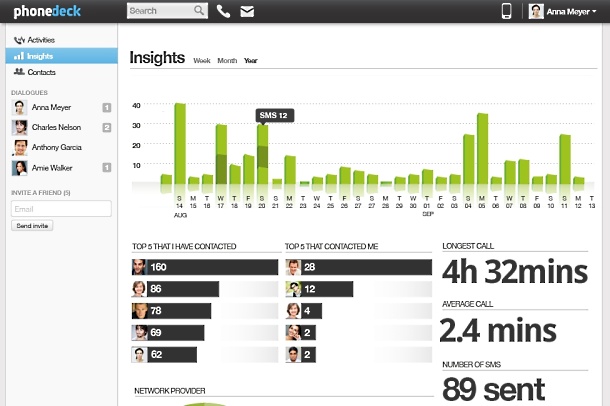Phonedeck puts Android phone functions into the cloud

Phonedeck, a free service that lets people access much of their Android handsets' phone functionality through an HTML5 browser, has been released.
The cloud service, unveiled on Tuesday, allows users to initiate, accept and reject calls from the browser, then pick up the phone to participate in those calls once they have been triggered. SMS text messages can be made and received through the web console, which also provides extensive usage analytics.

Phonedeck abstracts phone functionality into the cloud and also provides extensive usage statistics. Image credit: Phonedeck
Although the current version is free and aimed at consumers, Phonedeck has said that it will also bring out a paid-for business version that lets users publish details of calls and texts to enterprise platforms such as Salesforce.
"The idea for Phonedeck was born out of a vision of combining the strengths of two devices many people in business use every day; the portability and connectivity of mobile phones and the relative large screens and keyboards of personal computers," Phonedeck chief executive Frank Fitzek said in a statement.
The Berlin-based company soft-launched a cut-down test version of its product at the end of 2011, and in the intervening period it acquired 50,000 Android users and 150,000 Nokia Series 40 users. The Series 40 version allows almost all the same functionality as the Android iteration, except for the ability to accept or reject incoming calls from the browser.
Phonedeck uses SSL encryption on its Amazon EC2 servers, and the company is planning further encryption in the future, once it has acquired a large-enough user base. Rival service Airdroid adds extra security by only working when the handset and desktop have a direct Wi-Fi connection, but that service has less functionality than Phonedeck.
The service works by installing an app on the handset and logging in through a browser, although there is a Phonedeck Chrome extension that provides notifications of incoming calls even when the browser is closed.
There is no iOS version of the service yet, as Apple will not provide the API access needed to allow calls to be accepted or rejected through a desktop interface.
Although Fitzek said in the statement that Phonedeck has "a stable framework in place", the surge of interest that followed the service's release caused it to run very slowly, and Phonedeck was briefly down for maintenance on Wednesday morning, although it was back up at the time of writing.